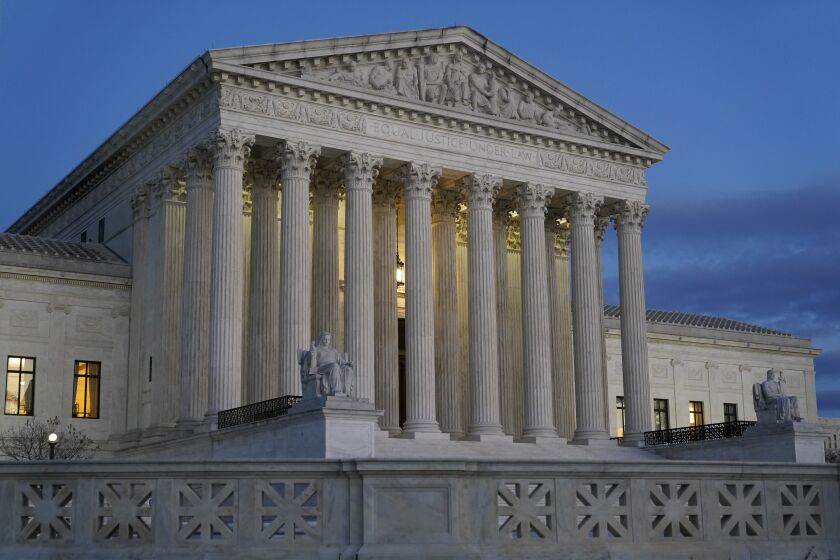Supreme Court Ruling Limits States’ Ability to Sue Federal Government Over Policy Disagreements
In a recent 8-1 decision, the Supreme Court affirmed a crucial principle: a state government should not be able to sue the federal government simply because it disagrees with a federal policy. This ruling, which should be obvious, has become increasingly important as political polarization has grown in recent years.
The trend of states filing suits to dismantle White House policies has intensified, with blue states challenging Trump-era policies and red states taking the Biden administration to court. The recent case of United States vs. Texas perfectly illustrates this trend.
In 2021, the Biden administration’s Department of Homeland Security announced its priorities for arresting and deporting undocumented individuals. Texas and Louisiana sued the administration, claiming that federal laws required the arrest of more people pending deportation. However, Justice Brett M. Kavanaugh, writing for the majority, ruled that the states lacked standing to sue. This decision was a rebuke to lower courts that had allowed the states to sue the federal government over a policy disagreement.
The Supreme Court’s decision closely follows earlier precedents and rightly limits the ability of states to sue in federal court based on a disagreement with a presidential policy. It recognizes that the government must make choices in enforcing the law and that it is not the role of the federal courts to second-guess those choices.
This ruling has significant implications for future cases involving states’ ability to sue over federal policy. It prevents a dangerous precedent where states could sue the federal government over any policy disagreement, whether it be drug laws, gun laws, or obstruction of justice laws.
While this decision may limit states’ ability to sue when there is a conservative Republican president, it does not completely close the door to all suits by states. States must simply meet the standing test, which requires them to show direct harm, causation, and the potential for remedy through a court decision.
In a separate case last week, the Supreme Court also restricted states’ ability to sue when they dislike federal policy. This consistent approach reinforces the court’s commitment to upholding the law and limiting states’ ability to challenge federal policies they disagree with.
Overall, the Supreme Court’s recent rulings serve as a reminder that the government must make choices in enforcing the law, and it is not the role of the courts to interfere with those choices. While this decision may have political implications, it is a necessary step in maintaining the balance of power between the federal government and the states.
Erwin Chemerinsky is a contributing writer to Opinion and dean of the UC Berkeley School of Law. This story originally appeared in Los Angeles Times.
Supreme Court’s Bold Ruling: Red States Cannot Sue Based on Dislike of Federal Law
In a landmark decision, the Supreme Court of the United States has delivered a resounding message to red states across the nation: you cannot sue the federal government simply because you dislike a particular federal law. This bold ruling, which upholds the principles of federalism and the supremacy of federal law, marks a significant step towards maintaining the balance of power between the states and the federal government.
The case at the center of this ruling involved a red state’s attempt to challenge a federal law that it deemed unconstitutional. The state argued that the law infringed upon its sovereignty and violated the rights of its citizens. However, the Supreme Court firmly rejected this argument, stating that the state’s dislike of the law was not sufficient grounds for a lawsuit.
This ruling is a clear affirmation of the long-standing principle that federal law takes precedence over state law. It underscores the fact that the Constitution grants the federal government certain powers that cannot be undermined by individual states. While states have the right to challenge federal laws in certain circumstances, such challenges must be based on legitimate legal grounds, not mere disagreement or dislike.
The Supreme Court’s decision is particularly significant in the current political climate, where red states have increasingly sought to challenge federal laws they perceive as encroaching upon their autonomy. This ruling sends a strong message that such challenges must be grounded in constitutional principles and not driven by partisan politics.
Moreover, this ruling reaffirms the importance of federalism in the American system of governance. Federalism, the division of power between the federal government and the states, is a fundamental principle that has shaped the nation since its inception. It allows for a balance of power, ensuring that neither the federal government nor the states become too dominant. By upholding the supremacy of federal law, the Supreme Court is safeguarding this delicate balance and preserving the integrity of the American system.
Critics of the ruling argue that it limits the ability of states to protect their citizens’ rights and interests. They contend that states should have the freedom to challenge federal laws that they believe are detrimental to their constituents. However, the Supreme Court’s decision does not completely foreclose states from challenging federal laws. It simply establishes a higher threshold for such challenges, requiring states to demonstrate a violation of constitutional principles rather than mere disagreement.
Ultimately, the Supreme Court’s bold ruling serves as a reminder that the judiciary plays a crucial role in upholding the rule of law and maintaining the balance of power in our democracy. It reinforces the principle that the Constitution is the supreme law of the land and that all states, regardless of their political leanings, must abide by its provisions.
As red states grapple with the implications of this ruling, it is important to remember that the strength of our democracy lies in its ability to accommodate diverse perspectives while upholding the principles that bind us together. The Supreme Court’s decision is a testament to the enduring power of the Constitution and the wisdom of the Founding Fathers in crafting a system of government that can withstand the test of time.
In conclusion, the Supreme Court’s bold ruling that red states cannot sue based on their dislike of federal law is a significant step towards preserving the balance of power between the states and the federal government. By upholding the supremacy of federal law and reaffirming the principles of federalism, the Court has sent a clear message that challenges to federal laws must be grounded in legitimate legal grounds, not mere disagreement. This ruling serves as a reminder of the importance of the judiciary in upholding the rule of law and maintaining the integrity of our democracy.









